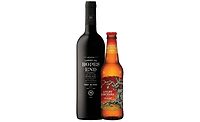
Dairy alternatives, kefir drinks and dairy-based drinks reported a mixed bag of results this year. The kefir and milk substitutes category benefited from new alternative dairy options, while flagship soymilk brands all reported declines.
Kefir and milk substitutes grew 7.7 percent to $536.9 million in food, drug, convenience, gas and mass merchandise outlets, excluding Wal-Mart for the year ending Sept. 5, SymphonyIRI, Chicago, reports. However, category leader Silk Soymilk, from WhiteWave Foods, Broomfield, Colo., reported a 12.7 percent decline in sales and a 9.7 percent drop in its 41.7 percent market share of the category in the measured channels during the time period. While Silk Light Soymilk remained basically flat, Silk Plus Soymilk’s sales sunk 32.1 percent. 8th Continent Soymilk also recorded a decline of 8.6 percent during the time period.
The only Top 10 soymilk to report an increase was private label soymilk, which grew 9.7 percent in measured channels for the year ending Sept. 5, SymphonyIRI says.




